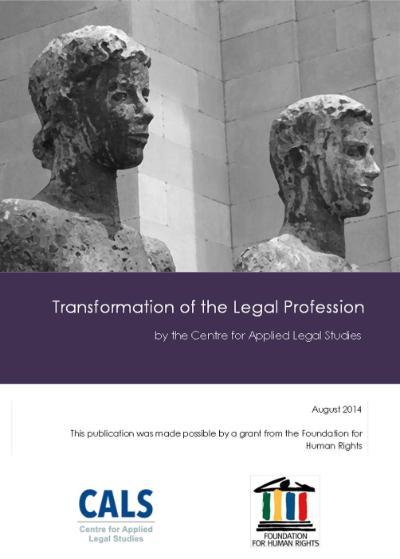The legal profession in South Africa continues to face the challenge of meaningful transformation more than 20 years post-democracy. Top positions in the profession, from partners in law firms to senior counsel and members of the judiciary, are still largely filled by white men. The lack of diversity in the judiciary has come under particular scrutiny in recent years. This lack of diversity cannot, however, be understood without examining transformation at all levels of the profession.
While there have been a large number of black women graduating from law schools in South Africa, comparatively few remain in the profession long enough to reach the top posts. In 2014, CALS partnered with two independent researchers to investigate the barriers which may be keeping black and/or female lawyers from advancing in the legal profession.
The research involved engaging directly with members of the profession at various stages of their careers, from recent graduates and candidate attorneys to senior professionals. The researchers used a combination of individual interviews, discussion groups and electronic surveys to engage participants.
The findings of the study are captured in the Transformation of the Legal Profession Report. They indicate that all three approaches consistently showed that race, gender and class are factors that lead to discrimination in the profession. There are still many barriers that restrict the careers of talented black and female lawyers, including racist treatment; sexual harassment; briefing patterns which give preference to white men; and a lack of accessible childcare facilities to name a few.
The findings of the report may go some way to explaining why there is relatively little diversity at the senior levels of the legal profession. They suggest that lawyers experience a range of hostility and exclusionary conduct based particularly on their race and gender. This is deeply inconsistent with the notion of dignity which underlies our constitutional democracy and represses talent in the profession. The report’s recommendations are for law firms and members of the bar to acknowledge and respond to patterns of discrimination, and to protect victims of discrimination and sexual harassment; and for government to map the progress of black women in the profession.
The report has already played an important role in opening a space to discuss issues of diversity and transformation in the profession and more broadly. CALS has participated in a discussion of the report held by the National Association of Democratic Lawyers on 17 October 2014 and officially launched the report on 30 September 2015.
 |
The initial findings of the project are captured in the Transformation of the Legal Profession Report. Many barriers still exist preventing black and female lawyers from progressing in the legal profession. |


